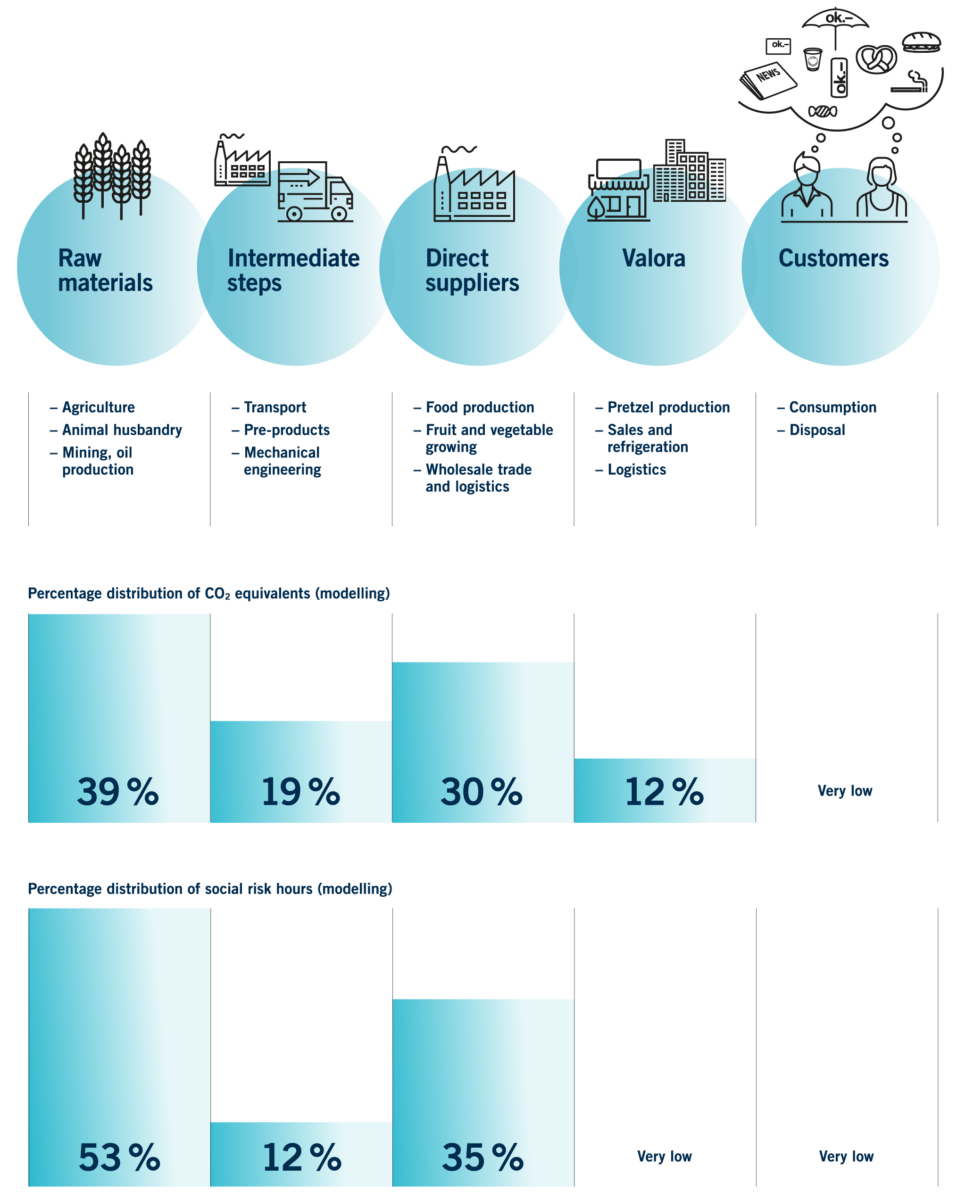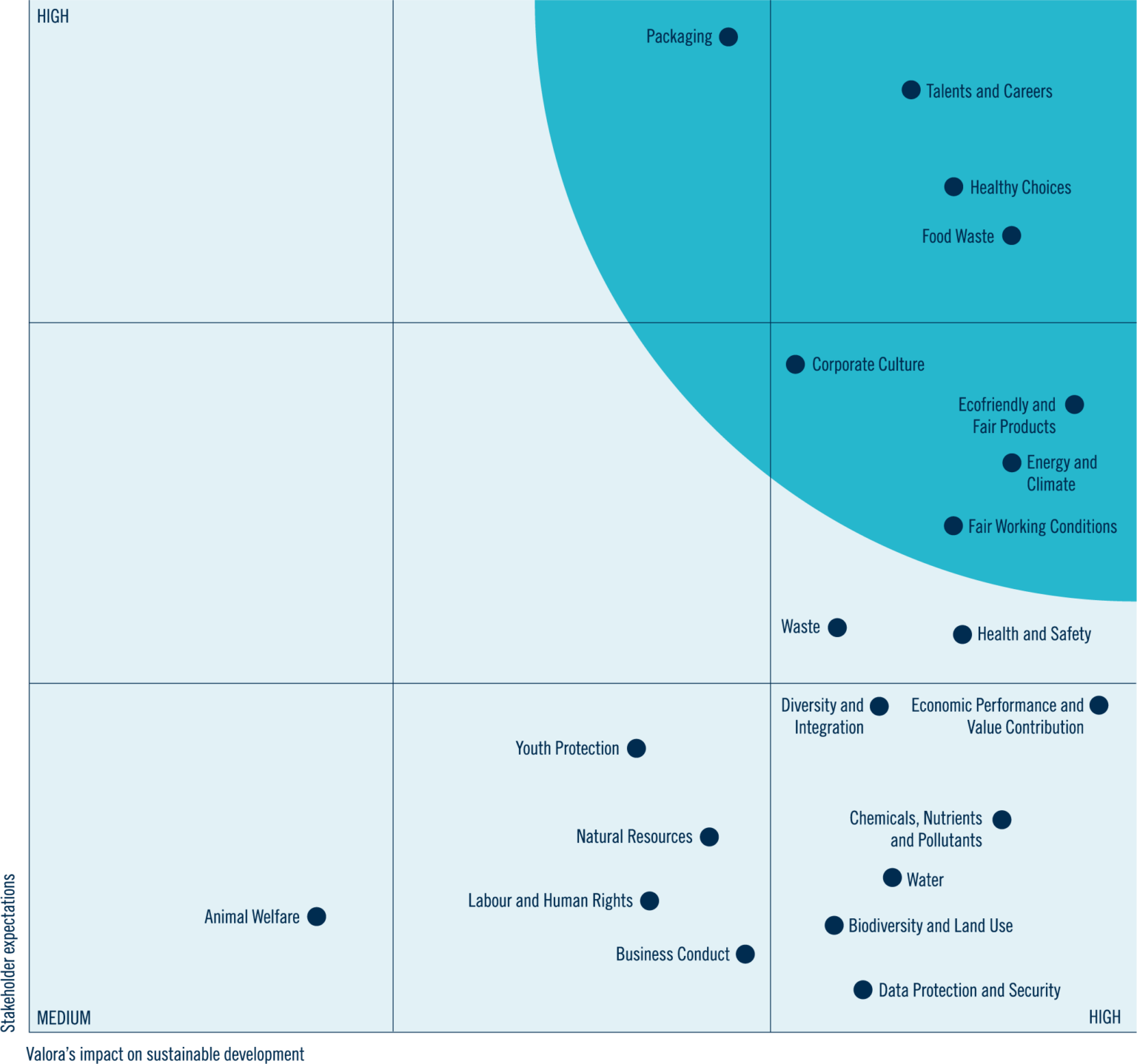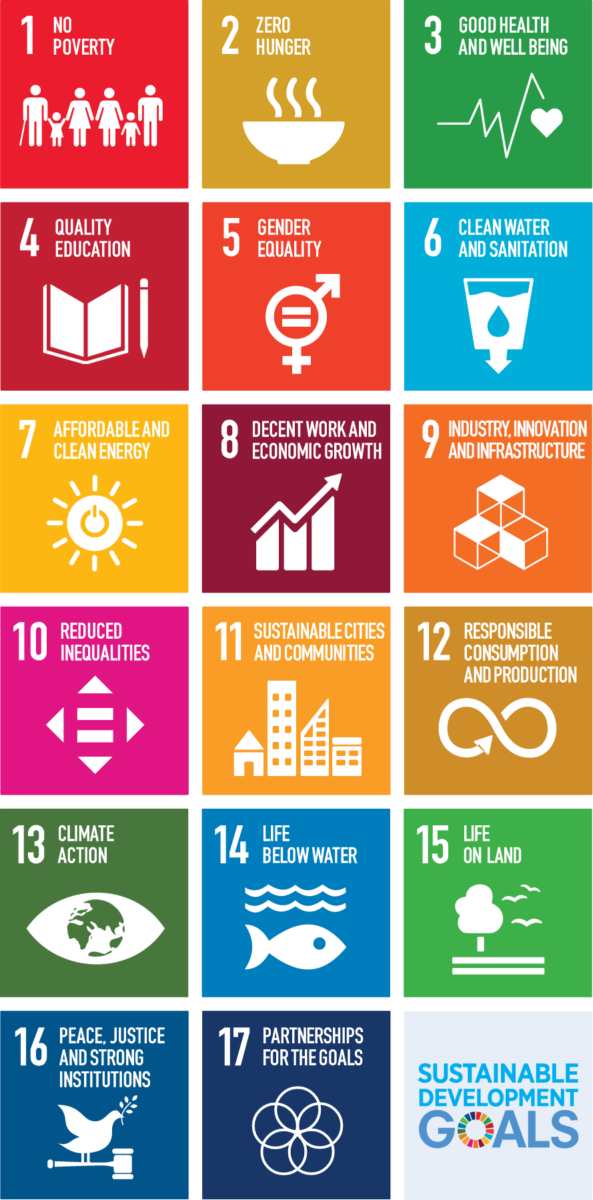A
changing
world
«War for Talents»
From the technical expertise of a programmer to the dexterity of a barista: specialists have their own ideas about where to look for work. Other factors such as demographic change, an increasingly dynamic labour market and constantly changing requirements in terms of skills are increasing the onus on Valora to be an attractive employer.
Climate change
The sixth IPCC report issued in August 2021 unequivocally confirmed the urgency of the situation. In order to keep global warming below 1.5 °C, CO2 emissions must be reduced by around two-thirds from 2020 to 2030. In addition, greenhouse gas emissions must be at net zero by 2050. Valora demands that on two fronts: for its own emissions and the emissions generated in the manufacture of its products.
Plastics and pollutants
The planet’s carrying capacity is also being exceeded with regard to material cycles, especially phosphorus and nitrogen, which are used in large quantities in agriculture. Furthermore, plastics are accumulating in the soil and water. That means the agricultural supply chains used for most of the products sold by Valora need to become more compatible with the environment. Plastic packaging needs to be scrutinised.
Human rights
Human rights are universal and immutable. Nevertheless, agricultural and international supply chains are fraught with risk. Following the “UN Guiding Principles on Business and Human Rights”, which were adopted in 2011, laws have recently been passed in the two Valora core markets of Germany and Switzerland on the duty of care incumbent on companies with respect to human rights.
Digitalisation
Digitalisation is changing communication, data availability and core processes. This offers companies such as Valora numerous opportunities to become more competitive and sustainable: data enables better planning to reduce food waste. Online purchasing processes increase comparability and selection. International supply chains can be monitored more effectively.
Strategy
Value chain and impacts
From field to customer: the Valora Group follows a sustainability strategy whereby it assumes responsibility along the entire value chain. The upstream value chain ranges from raw material production through to agriculture and several processing steps to wholesalers and logistics. Valora obtains goods, including own brands, through these suppliers and sells them to consumers (B2C). It also supplies items from its own pretzel production facilities to other companies (B2B). The different sales outlet formats are operated by Valora employees or franchise and agency partners with their own employees. They all brighten up their customers’ journey, particularly at transport hubs and central urban locations.
Footprint analysis
In 2021, Valora carried out a footprint analysis to better understand the environmental impacts and social risks in its value chain. Based on purchasing data and average values per product group, CO2 equivalents, pollutants as well as land and water use were modelled. Social risk hours are also included, i.e. hours worked at the risk of human rights violations. The footprint analysis enables Valora to identify levers and hotspots at all levels of the supply chain and address them in a targeted manner.
Value chain and impacts
The footprint analysis showed that the majority of modelled CO2 emissions and social risks arise from raw material production: agricultural processes such as wheat, tobacco or animal feed cultivation have the greatest impact.
The analysis also showed that CO2 and pollutant emissions are far more significant in environmental terms than water and land use. The social risks, on the other hand, are greatly dependant on the product’s country of origin: while the raw materials for baked goods mainly come from Central Europe, the cultivation areas for tobacco, coffee and cocoa are located in the Global South and pose greater human rights violation risks.
For Valora, these findings mean that the company must also go beyond its core business along its value creation chain to achieve its long-term sustainability goals. Together with the suppliers and partners, Valora Group wants to contribute to limiting global warming to 1.5 °C. That is why the company is working towards climate neutrality by 2050. The Board of Directors is currently discussing the stages and specific objectives for the coming years, to reduce emissions caused directly by Valora and along the supply chains.
Value chain
Stakeholder dialogue
In order to develop its sustainability strategy, Valora analysed the expectations of its stakeholders on the basis of structured interviews in 2019. Since then, Valora has kept abreast of expectations through ongoing dialogue with interest groups. In addition, sustainability topics are explicitly addressed in the day-to-day dialogue with external partners.
If changed stakeholder expectations are repeatedly identified, this leads to adjustments to the sustainability strategy. In 2021, the dialogue with interest groups has confirmed the strategy.
Stakeholder expectations
Customers
Fair working conditions
Sustainably manufactured products
Packaging
Agency and franchise partners and their employees
Fair partnerships
Employee development
Fair working conditions and salaries
Employees
Employee development
Fair working conditions and salaries
Leadership and corporate culture
Job offer
Landlords
Waste and food waste
Sustainably manufactured products
Investors
Fair working conditions
Management and corporate culture
Fair partnerships
Sustainably manufactured products
Environmental organisations
Sustainably manufactured products
Political influence
Packaging
Energy and resource consumption
Suppliers
Sustainably manufactured products
Less/sustainable packaging
Employee development
Materiality analysis
The results of the stakeholder interviews were compiled into a materiality matrix (see chart below): The vertical axis shows stakeholder expectations of Valora, while the horizontal axis shows the effects (impact) of Valora’s business on sustainable development. The Materiality matrix impact axis was supplemented and updated in 2021 with the results of the footprint analysis.
For Valora, the materiality matrix forms the basis for identifying and prioritising its sustainability topics. The eight topics highlighted in dark colour in the top right were classified as material. Further details of the materiality analysis are outlined in the 2019 Sustainability Report.
Materiality matrix
Results from the footprint analysis and stakeholder dialogue
Defining the strategy
Review of topics
In order to define the Valora Group’s sustainability strategy from the eight material topics in the matrix, the first step was to consider the topics from an economic perspective and align them with the corporate strategy. Conclusion: Fair working conditions and the promotion of talent contribute to the attractiveness of the workplace. Measures to save energy and combat food waste enable lower costs. Just like more sustainable packaging, sustainable and healthy products are a competitive advantage. The sustainability strategy thus supports the path chosen by Valora Group – the material topics correspond to double materiality.
In a second step, a comparison of the eight material topics with the United Nations’ Sustainable Development Goals (SDGs) showed that Valora is actively addressing eight of the 17 goals in its initiatives. There are no other relevant SDGs to which a foodvenience provider could make a relevant contribution. Valora’s sustainability strategy therefore aligns with the focus of the goals set by the United Nations.
Strategy development
As a next step, seven of the eight material topics from the materiality matrix were clustered and allocated to three pillars: People, Planet, Products. Measures and key figures were defined for each topic and adapted to the different business areas. For example, depending on the format, the energy management focus is on refrigerators, air-conditioning systems, or ovens.
The eighth main topic, cultural change as an enabler, together with stakeholder engagement and innovation, forms the basis for implementing the sustainability strategy. It is therefore managed as an interdisciplinary topic (see page 68).
Current status
Valora’s Board of Directors and Group Executive Management are unwavering in their commitment to sustainable business practices: sustainability is firmly anchored as the fifth pillar in the corporate strategy. The COVID-19 crisis has impacted and delayed individual sustainability projects in some cases. As a result, it has not yet been possible to compile the desired data and some projects have had to be postponed.
These projects will be continued in 2022. At the same time, new, long-term sustainability goals are being defined to decarbonise own activities and the supply chains. Valora is thus on its way to achieving climate neutrality by 2050. Accordingly, sustainability is given greater weight when working with suppliers.
Report structure
In accordance with the GRI reporting standards, a chapter is devoted to all key topics (with the exception of cultural change). The chapters address relevance and progress. A table summarises the measures and implementation status. An evaluation of what has been achieved and an outlook for 2022 round off the topic chapters. The quantitative information is presented in tabular form at the end of each of the three pillar chapters.
- Delays due to the COVID-19 crisis are marked with a virus symbol for progress made in 2021. In addition, the implementation of the projects announced for 2022 depends on how the pandemic develops.
People
Becoming an
attractive place to work for everyone
- Fair Working Conditions
- Talents and Careers
Planet
Becoming a
climate-neutral company
- Food Waste
- Energy and Climate
Products
Becoming the go-to place
for sustainable foodvenience
- Ecofriendly and Fair Products
- Healthy Choices
- Packaging
2022 © Valora Holding AG


